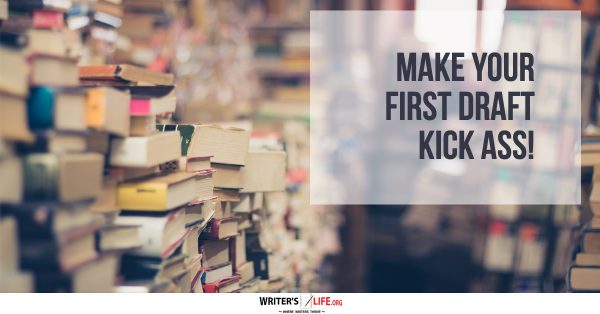- How To Tackle Jealousy In Creative Writing
- Common Submission Mistakes
- How To Stop Your Blog Becoming Boring
- The One Thing Every Successful Writer Has In Common
- How To Make Yourself Aware Of Publishing Scams
- Why Almost ALL Writers Make These Grammar Mistakes At Some Point
- 5 Tips For Authors On How To Deal With Rejection
- Top Mistakes to Avoid When Writing a Novel
- How to Avoid Common New Writer Mistakes
- 10 Mistakes New Fiction Writers Make
Make Your First Draft Kick Ass!

We hear it time and time again. First drafts are rubbish. No matter how talented a writer you are, the first draft of your book will be full of errors, of self-indulgent nonsense, of poor character development, of inconsistencies and embarrassing cliches.
We accept this as writers, and for the most part, we’re OK with it. We know that we need to just get through our first drafts, to not be perfectionists, to simply get the story down. Then, it is through the redrafting and editing process that our stories really begin to take shape.
The problem with this idea, however, is that it can be all too easy to become lazy with our first drafts. We know that we can fix them later so why really pay attention to them initially? This idea that everything can be changed later, and that most writers practically tear up their first drafts and start all over again is a dangerous one.
While we shouldn’t get stuck in a pattern of censoring ourselves or criticising ourselves so much that we can’t get the first draft done, similarly we should try our hardest at every stage of the writing process to make our books the very best they can be.
No writer really wants to get to the end of their first draft and think ‘well that was terrible, let’s start again.’ We want to use our first drafts as a great starting point to make our stories even more awesome.
So how do you write a first draft that kicks ass? Let’s look at what you should concentrate on and try to include to make it a brilliant base when you come to the editing stage.
Conflict
Your first draft should include all major conflict, decisions, dilemmas and their consequences. Make sure you plot out where the conflicts are in your novel and really focus on making these effective and meaningful. All great stories include conflicts of some kind, struggles and sacrifices and a journey which your main protagonist must navigate in order to get (or not get) what they set out to find.
Characters
By the end of your first draft, you should really feel like you know your characters inside out, and it should be apparent to the reader who the are, how they think and how they differ from one another. Each of your characters should have a distinctive voice and you should instinctively know how they would act or react in any given situation. This will help you no end when it comes to editing your first draft - you’ll easily be able to spot where what they say or do doesn’t quite sit right.
Drama
Your first draft should have plenty of drama. Try to separate each chapter into an exciting mini story - it should open well and end on a cliffhanger so your readers are intrigued to know what happens next.
Disaster
Even the happiest of books have low points, parts where everything seems to be going wrong, and where it doesn’t look like the protagonist will achieve their goals. Make your disasters effective, make the reader care, and ensure they go on for just long enough that your reader starts to despair - then, suddenly give them a glimmer of hope once more.
Resolution
Your book can end however you want it to end. But what it can’t do is leave the readers feeling as though the have been cheated. Your ending can be happy, sad, dramatic, poignant, hilarious, terrifying or any number of things but the reader must feel as though it is fair the book has ended. If you leave them full of questions and confusion they won’t be happy. Try to get this right in your first draft and you’ll feel as though your story is truly complete.
Of course, you can always change these elements of your book when you come to the editing stage, and many authors do. However, really focusing on making these parts strong, and writing them well, will mean the basic structure of your story is there, and that it’s good, and instead of flushing your first draft down the toilet (metaphorically speaking), you’ll be proud of what you’ve achieved so far, and be excited to start the next stage.

Bethany Cadman -author of 'Doctor Vanilla's Sunflowers'


























